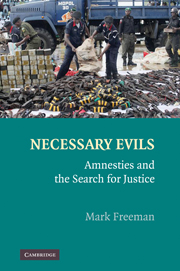Book contents
- Frontmatter
- Contents
- Preface
- Acknowledgments
- Abbreviations and Legal Terms
- Opening Considerations: On the Perennial Relevance of Amnesties
- Part I The Debate on Amnesties
- Part II The Design of Amnesties
- Final Considerations: On the Perennial Contestation of Amnesties
- Appendix 1 Summary Guidelines for Effective Amnesty Design
- Appendix 2 Selected Excerpts from International Legal Instruments
- Appendix 3 Selected Excerpts from Jurisprudence on Amnesties
- Notes
- Index
Appendix 2 - Selected Excerpts from International Legal Instruments
Published online by Cambridge University Press: 04 May 2010
- Frontmatter
- Contents
- Preface
- Acknowledgments
- Abbreviations and Legal Terms
- Opening Considerations: On the Perennial Relevance of Amnesties
- Part I The Debate on Amnesties
- Part II The Design of Amnesties
- Final Considerations: On the Perennial Contestation of Amnesties
- Appendix 1 Summary Guidelines for Effective Amnesty Design
- Appendix 2 Selected Excerpts from International Legal Instruments
- Appendix 3 Selected Excerpts from Jurisprudence on Amnesties
- Notes
- Index
Summary
TREATY SOURCES
1977 – Protocol II to the Geneva Conventions, Article 6.5
At the end of hostilities, the authorities in power shall endeavour to grant the broadest possible amnesty to persons who have participated in the armed conflict, or those deprived of their liberty for reasons related to the armed conflict, whether they are interned or detained.
NONTREATY SOURCES
1989 – UN Principles on the Effective Prevention and Investigation of Extra-legal, Arbitrary, and Summary Executions, Article 19
In no circumstances, including a state of war, siege or other public emergency, shall blanket immunity from prosecution be granted to any person allegedly involved in extra-legal, arbitrary or summary executions.
1993 – UN Declaration on the Protection of All Persons from Enforced Disappearances, Article 18(1)
Persons who have or are alleged to have committed offences referred to in Article 4, paragraph 1, above, shall not benefit from any special amnesty law or similar measures that might have the effect of exempting them from any criminal proceedings or sanction.
2004 – Report of the Secretary-General on the Rule of Law and Transitional Justice in Conflict and Post-Conflict Societies, UN Doc. S/2004/616, Paragraphs 10, 32, and 64
Section IV. Basing assistance on international norms and standards
10. United Nations norms and standards have been developed and adopted by countries across the globe and have been accommodated by the full range of legal systems of Member States, whether based in common law, civil law, Islamic law, or other legal traditions.
- Type
- Chapter
- Information
- Necessary EvilsAmnesties and the Search for Justice, pp. 192 - 195Publisher: Cambridge University PressPrint publication year: 2009



